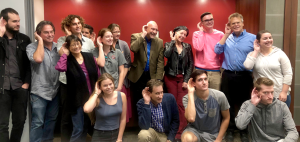
Participants listened closely as noted Sound Ecologist, Dr. Bryan Pijanowski, presented Seven Sonic Pathways to Address A Silent Wicked Problem: A Call to Arms for Scholars in the Sciences and Humanities to Join Forces to Confront the Planet’s Current Biodiversity Crisis for faculty and students on November 1. Dr. Pijanowski works at Purdue University as Professor and University Faculty Scholar in the Department of Forestry and Natural Resources; Director of the Discovery Park Center for Global Soundscapes; Project Manager for Record the Earth Global Citizen Science Project; and Executive Producer, Global Soundscapes! A Mission to Record the Earth (an interactive IMAX experience).
In addition to camping together, Dr. Pijanowski’s seven pathways for humanists and scientists to successfully collaborate are:
- Focus on a problem together (one wicked problem such as the biodiversity crisis).
- Select a unified modality (e.g., music to help tell the story and get people to pay attention).
- Develop a common vocabulary (e.g. musiciology, soundscapes, ecology, truth, sustainability, chorus, song, communication, timbre, culture).
- Create a strong message outcome (we are the world) and put it in front of everybody.
- Remove bias across professions (review professional norms, academic homes, the art of scholarship, funding opportunities, equitable grounds, single author in humanities vs collaborative in sciences, etc.).
- Educate side by side (activities and programs should be open across disciplines)
- Integrate methods and tools (e.g. geographic information systems, computational musicology, ethnographic approaches, performance spaces).
Dr. Pijanowski’s visit was hosted by UCF’s Texts & Technology doctoral program, the Center for Research and Education in Arts, Technology and Entertainment (CREATE), and the Center for Humanities and Digital Research (CHDR).